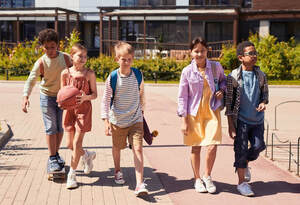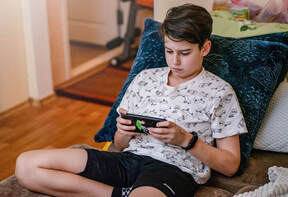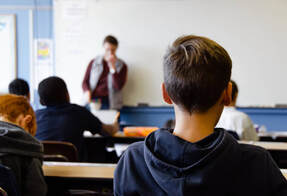By Sybil Cummin, MA, LPC, ACS

90 degree days are here! Time to go swimming and camping. Time to stay up late and time to sleep the day away.
These are some of the things that my boys are loving about summer.
And even though it is still July, I am already dreading the transition to going back to school.
While the transition from the carefree days of summer break can be challenging for most children, it can be particularly tough for those with Attention Deficit Hyperactivity Disorder (ADHD). So, why is this shift from summer vacation back to the routine of school days difficult for children with ADHD?
These are some of the things that my boys are loving about summer.
And even though it is still July, I am already dreading the transition to going back to school.
While the transition from the carefree days of summer break can be challenging for most children, it can be particularly tough for those with Attention Deficit Hyperactivity Disorder (ADHD). So, why is this shift from summer vacation back to the routine of school days difficult for children with ADHD?
- Disruption of the Routine
Even though it may not seem like you have a routine or structure over the summer, the lack of routine is their routine. Suddenly, they are expected to adhere to more rigid school routines and routines to get them too and from school and for many the demands of homework. This abrupt change can be overwhelming for children with ADHD, who typically struggle with transitions and thrive on predictability and structure. - Difficulty Shifting Focus
While my son with ADHD proudly states that he can do many things at the same time (namely how many screens he is watching at the same time he is sorting through his Pokémon cards), children with ADHD often face challenges in shifting their attention and focus from one task to another. This is especially true if they have little to no interest in an activity. Over the summer break, they have the opportunity to engage in activities that they find particularly interesting or enjoyable, such as outdoor play or video games. Consequently, when faced with less stimulating, dare I say boring, activities in the classroom, it becomes much more difficult for them to maintain their focus or switch from one boring activity to another. - Increased Sensory Stimulation
There is often a significant difference between the level of sensory stimulation at home versus the school environment. Classrooms are typically filled with multiple distractions, such as noise, bright lights, and crowded classrooms. If your ADHD child experiences sensory processing difficulties, these environments can be dysregulating and overwhelming. This overwhelm can hinder their ability to concentrate, stay organized, learn, and regulate their emotions effectively. - Shift in Social Dynamics
During summer vacation, children often spend more time with family, and some are able to spend more time with a select group of friends all while in a less structured setting. Returning to school means reestablishing social connections and navigating more complex social dynamics. Children with ADHD may find it more difficult to adjust to the social demands and social norms of the school environment. This includes making new friends, interacting with peers they dislike, interacting with adults in a position of authority, and managing social conflicts. These social interactions can add an additional layer of stress that may affect their mental health and academic functioning.
So, what can us parents do to set our kids up for success during this transition while maintaining our sanity?
- Start Establishing Routines Early
While it may seem premature, starting to shift your child’s routine to be more in-line with what things will look like during the school year can be extremely helpful. Gradually reintroduce more structured activities and responsibilities into their day. Slowly start moving your child’s bedtime earlier and have a regular wake-up time in the morning. Will they fight this? Most likely they will. Be transparent about why you are starting the plan so early and allow them to share their input on how to best get back onto a more set schedule. - Reinforce Time Management Skills
Time management is often a challenge for these kids. Helping them create skills to manage their time will help them for years to come. For example, maybe you ask that specific chores get done by a certain time during the day. It is likely that they will forget or get distracted by a much more enjoyable activity and miss the deadline. Use this as a teaching moment. What can they put into place that can alert them to the time? Have them assess the length of time a particular task might take them (they will either under or over exaggerate at first depending on if they are playing the victim and want your sympathy). Then ask them to set an alarm for when they want to complete the activity so that it gets done in time. Will they do this perfectly the first time Or the time after that? Nope. But it is allowing them to start to learn about themselves and what amount of time they need to complete different tasks. - Maintain Open Lines of Communication and a Non-Judgmental Posture
If we as parents are doing everything for our children to ensure that they are organized and on time, they will not learn how to do it for themselves. Will they like these new rules that you are putting in place? Absolutely not. So, it is important to allow them to share how they feel about the transition and to have some input into the plan (within reason) so that they can feel a sense of autonomy and that you both are on the same team. Be transparent. Be curious about their feelings. Be honest about your worries. Be a safe place for them to fall down and make mistakes. Allow them to make mistakes without jumping down their throat.
Transitioning from the freedom of summer vacation to the structured school environment can be an uphill battle for both children with ADHD and their parents. By understanding these challenges we can provide the necessary support and implement strategies that promote a smoother transition back to school. Remember, some proactive planning and a little (or a lot) of empathy for both you and your child can go a long way in making this transition a successful one.

These products may be helpful as your child transitions back to school. Please note that these are affiliate links, which means we may earn a small commission if you make a purchase through those links. You won’t be charged anything extra, and this commission helps me to continue to provide valuable content on this website, my podcast, and on my social media channels.
Rest assured, we only recommend products and services that we genuinely believe in. Our primary goal is to provide helpful information and guide you in making informed decisions. If you have any concerns or a negative experience with one of these , we want to hear about it, so that we can ensure we are only providing the best resources possible.
All Dogs Have AHDD
By Kathy Hoopmann
Aaron's Thinking Putty
Wiggle Seat - Circle
Wiggle Seat - Angle
Reading Highlighter Strips
Rest assured, we only recommend products and services that we genuinely believe in. Our primary goal is to provide helpful information and guide you in making informed decisions. If you have any concerns or a negative experience with one of these , we want to hear about it, so that we can ensure we are only providing the best resources possible.
All Dogs Have AHDD
By Kathy Hoopmann
Aaron's Thinking Putty
Wiggle Seat - Circle
Wiggle Seat - Angle
Reading Highlighter Strips





 RSS Feed
RSS Feed
